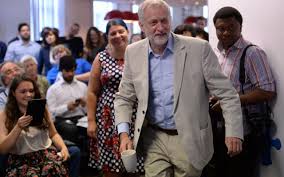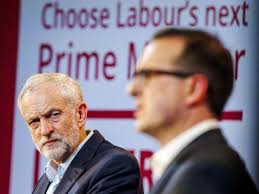The Labour leadership contest: what you need to know – Ben Banks
The Labour leadership campaign is now fully underway, with Jeremy Corbyn fighting to remain its leader, and Owen Smith challenging him. The contest started when 23 members of Mr Corbyn’s shadow cabinet resigned, and a vote of no confidence showed that 172 Parliamentary Labour Party (PLP) members did not think he had what it takes to lead them. With only 40 members backing him, many thought that his only option was to resign, but Mr Corbyn appears to be alive and kicking, more perhaps than when he was campaigning against Brexit, which incidentally was the trigger for the large number of resignations. The result will be decided on 24th September.
So who are the two candidates and what have they got going for them? Owen Smith is Welsh by origin, and went to the University of Surrey, where he read history and French. He has been in politics since around 2002 when he was an advisor to the Secretary of State for Wales, Paul Murphy. He then went on to be an advisor for pharmaceutical company Pfizer, and became a member of parliament for Pontypridd in 2010 (only just however, as the labour majority fell by 25%). He was chosen as Shadow Secretary of State for Wales in 2012 under Ed Miliband, and as Shadow Secretary of State for Work and Pensions in 2015 under Jeremy Corbyn. He identifies, similar to Corbyn, as a democratic socialist.
He opposed austerity cuts made by George Osborne and in his speech running for candidacy for leadership this year said he would reverse the cuts to corporation, capital gains and inheritance taxes. He also wants to increase income tax by up to 50% of wealth, and invest £200 billion into infrastructure and housing projects. He would also ban zero hour contracts and possibly repeal the ‘Trade Unions Act’, arguing that workers need more representation and presence in arguments over wages. On the NHS, he would create a 15% tax on the unearned income of the richest 1% of society, which would increase spending by 4% by the equivalent of £3 billion.
Jeremy Corbyn had a different path into politics. Whilst at school, where he achieved two Es at A level, he was part of a his local labour/ socialist party and also joined the campaign for nuclear disarmament (CND). At 22 after three years voluntary work in Jamaica he returned and joined the National Union for Tailors and Garment Workers. He then dropped out of North London Polytechnic on a trade unions course after disagreeing with tutors. He subsequently worked under various labour leaders including Tony Benn until he eventually became the MP for Islington North in 1983 at the age of 34. (He has been re-elected seven times, last year with a 60% majority).

Until 1997 he was a backbencher and won various political struggles on issues such as apartheid in South Africa and dress code in the commons. He also lost some arguments: nearly going to jail for not paying the poll tax in a protest and mistakenly campaigning for the release of the bombers of the Israeli embassy (who were found guilty). He has been extremely rebellious – being the second most rebellious MP of all time, disobeying the whip on 428 occasions under the Labour government of 1997-2010. He has however arguably stuck by his beliefs, being part of the Stop the War Coalition and campaigning against fascism, injustice and, of course, war at all times.
Coincidently, Mr Corbyn has very similar views to Mr Smith: he would like to increase income tax, create a national living wage of £10 an hour, and stop companies receiving an alleged £93 billion a year in tax relief (through subsidies and grants). He opposes austerity and also thinks that quantitative easing should switch to investing in houses as opposed to buying the assets of commercial banks. He also promised a £500 billion increase in public spending, neglecting how this would be funded.
A topic the contenders differ on is nuclear disarmament. Although Owen Smith argues against nuclear weapons, he wants Britain to have the presence of a nuclear deterrent, manifest in Trident, whilst there is still a threat to public security. Jeremy Corbyn however has been a member of the CND since he was 16 and therefore campaigns strongly against violence of any kind, especially nuclear weapons. Mr Corbyn has also been a strong advocate for an end to violence in the Middle East, promoting peaceful negotiations between countries as opposed to the military intervention that he argued so passionately against notably during the Iraq War.
So, we have established that both candidates have similar views; what then will make the difference in the leadership campaign? Owen Smith, it is safe to say, is definitely viewed, not only by most of his fellow MPs, but also by the public, as the more sensible of the two. His policies are well reasoned, and contain factual information, justifying his arguments. Although under Mr Corbyn’s leadership the party has grown to be the largest in Europe with 500,000 members, Mr Smith argues justifiably that he does not have the breadth of appeal across labour voters that he needs to win.
Jeremy Corbyn is less precise – his policies, although admirable, lack evidence. He fights against inequality, but whether his methods for doing this will work in the practise, is hard to tell. However in a world where Donald Trump is actually taken seriously by over 110 million Americans (the leaders of the free world!), and voters continually ignore fact and reason, there is a high possibility that Mr Corbyn will retain his leadership – in a poll on 1st September conducted by YouGov, 62% of labour voters backed Mr Corbyn. Complementing this, 97% of his supporters argue he is portrayed in a bad light by the media (which may create a further influx of sympathy votes).
Even if Mr Corbyn retains his leadership, which is likely to be the case, there is only a tiny possibility of Labour forming a government at the next general election – a mere 3 of 116 voter intention surveys found Labour in front in the polls. Unfortunately, many voters are more concerned with the vision and morals of the person, rather than their effectiveness as a leader. To present any real challenge to a Conservative government, which are widely seen to have a free reign of policy while labour are still in disarray, a new leader needs to be elected; Owen Smith would be a step in the right direction, even if he is still a long way from the formidable government of Tony Blair’s ‘New Labour’ movement, but the likelihood of that is slim.















Post Comment
You must be logged in to post a comment.